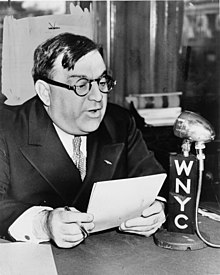Mayor Fiorello LaGaurdia
| Fiorello H. La Guardia | |
|---|---|
 |
|
| 99th Mayor of New York City | |
|
In office January 1, 1934 – December 31, 1945 |
|
| Preceded by | John P. O'Brien |
| Succeeded by | William O'Dwyer |
| Member of the U.S. House of Representatives from New York's 20th district |
|
|
In office March 4, 1923 – March 3, 1933 |
|
| Preceded by | Isaac Siegel |
| Succeeded by | James J. Lanzetta |
| 10th President of the New York City Board of Aldermen | |
|
In office January 1, 1920 – December 31, 1921 |
|
| Preceded by | Robert L. Moran |
| Succeeded by | Murray Hulbert |
| Member of the U.S. House of Representatives from New York's 14th district |
|
|
In office March 4, 1917 – December 31, 1919 |
|
| Preceded by | Michael F. Farley |
| Succeeded by | Nathan D. Perlman |
| Personal details | |
| Born |
Fiorello Enrico La Guardia December 11, 1882 Greenwich Village, New York, U.S. |
| Died | September 20, 1947 (aged 64) Riverdale, The Bronx, New York, U.S. |
| Political party |
Republican (1917–24; 1934–47) Progressive (1924–34) |
| Spouse(s) |
Thea Almerigotti (m. 1919; d. 1921) Marie Fisher (m. 1929) |
| Children | 2 |
| Education | Timothy Dwight School |
| Alma mater | |
| Profession | Politician |
| Signature | |
| Military service | |
| Allegiance | United States of America |
| Service/branch | United States Army Air Service |
| Years of service | 1917 – 1919 |
| Rank | Major |
| Battles/wars | World War I |
Fiorello Henry La Guardia (/fiəˈrɛloʊ ləˈɡwɑːrdiə/; born Fiorello Enrico La Guardia, Italian pronunciation: [fjoˈrɛllo enˈriːko la ˈɡwardja]) (December 11, 1882 – September 20, 1947) was an American politician. He is best known for being the 99th Mayor of New York City for three terms from 1934 to 1945 as a Republican. Previously he had been elected to Congress in 1916 and 1918, and again from 1922 through 1930. Irascible, energetic, and charismatic, he craved publicity and is acclaimed as one of the greatest mayors in American history. Only five feet, two inches (1.57 m) tall, he was called "the Little Flower" (Fiorello is Italian for "little flower").
La Guardia, a Republican who appealed across party lines, was very popular in New York during the 1930s. As a New Dealer, he supported President Franklin D. Roosevelt, a Democrat, and in turn Roosevelt heavily funded the city and cut off patronage for La Guardia's enemies. La Guardia revitalized New York City and restored public faith in City Hall. He unified the transit system, directed the building of low-cost public housing, public playgrounds, and parks, constructed airports, reorganized the police force, defeated the powerful Tammany Hall political machine, and reestablished employment on merit in place of patronage jobs.
...
Wikipedia
